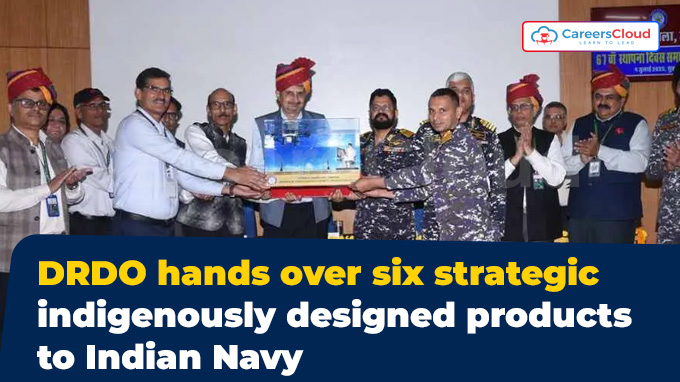 In July 2025, the Defence Research and Development Organisation (DRDO) handed over six indigenously designed and developed strategic products to the Indian Navy (IN) during a ceremony held at the Defence Laboratory in Jodhpur, Rajasthan.
In July 2025, the Defence Research and Development Organisation (DRDO) handed over six indigenously designed and developed strategic products to the Indian Navy (IN) during a ceremony held at the Defence Laboratory in Jodhpur, Rajasthan.
- The six products are: the Gamma Radiation Aerial Surveillance System (GRASS), Environmental Surveillance Vehicle (ESV), Vehicle Radiological Contamination Monitoring System (VRCMS), Underwater Gamma Radiation Monitoring System (UGRMS), Dirt Extractor and Cross Contamination Monitor (DECCOM), and Organ Radioactivity Detection System (ORDS).
- These systems, developed by DRDO, were designed to fulfill the Naval Staff Qualitative Requirements (NSQR) and support India’s broader mission to strengthen indigenous defense capabilities.
Key people:
The products were handed over by Dr. Samir Vankatpati Kamat, Secretary of the Department of Defence Research and Development (DDR&D) and Chairman of DRDO, to Rear Admiral Sriram Amur, Assistant Chief of Naval Staff (Special Submarine Projects) – ACNS(SSP), Naval Headquarters, New Delhi, Delhi.
List of Products Handed Over to the Indian Navy:
i.Gamma Radiation Aerial Surveillance System (GRASS): Designed for aerial monitoring in nuclear-affected zones, GRASS uses a compact gamma radiation sensor that can be mounted on unmanned aerial platforms. It enables quick radiological assessments during nuclear emergencies.
ii.Environmental Surveillance Vehicle (ESV): Developed by the Vehicles Research and Development Establishment (VRDE), a DRDO laboratory, ESV detects and evaluates contamination caused by nuclear, biological, or chemical (NBC) agents in high-risk areas. It aids real-time analysis and decision-making during emergencies.
iii.Vehicle Radiological Contamination Monitoring System (VRCMS): Tracks and assesses radiological contamination in vehicles that have operated in radiation-exposed areas, ensuring effective decontamination procedures.
iv.Underwater Gamma Radiation Monitoring System (UGRMS): Measures underwater gamma radiation levels and relays real-time data to remote stations. It plays a critical role in maritime safety and nuclear site monitoring.
v.Dirt Extractor and Cross Contamination Monitor (DECCOM): Designed to prevent the spread of hazardous materials, DECCOM collects contaminants from footwear in radiation-affected or chemically exposed zones.
vi.Organ Radioactivity Detection System (ORDS): A diagnostic system that detects radiation exposure in human organs, especially valuable during nuclear disasters and in medical evaluations.
DRDO & AIIMS Bibinagar Jointly Unveiled ADIDOC:
In July 2025, the Defence Research and Development Laboratory (DRDL), a laboratory of the DRDO and the All India Institute of Medical Sciences (AIIMS), Bibinagar(Telangana), jointly unveiled India’s first indigenously designed and developed advanced carbon fibre foot prosthesis named ‘ADIDOC’ (AIIMS Bibinagar – DRDL, DRDO Indigenously Developed Optimised Carbon Foot Prosthesis) at AIIMS Bibinagar in Telangana.
- The unveiling was led by Dr G.A. Srinivasa Murthy, Director of DRDL, and Dr Ahanthem Santa Singh, Executive Director (ED)of AIIMS Bibinagar.
- This development marks a significant step under the ‘Aatmanirbhar Bharat’ initiative, aimed at achieving self-reliance in advanced medical technology, specifically in the area of prosthetics.
About ADIDOC:
i.ADIDOC is designed to offer a cost-effective and high-performance alternative to currently available imported models.
ii.Design & Performance: It is biomechanically tested to withstand loads up to 125 kilograms (kg), with an adequate factor of safety, making it suitable for K3-level active users (highly dynamic users).
iii.Variants: The prosthesis is available in three weight-specific variants to cater to different patient profiles.
iv.Cost: The production cost of ADIDOC is estimated to be under Rs 20,000, compared to imported models that cost around Rs 2 lakh.
Recent Related news:
In May 2025, Pune (Maharashtra)-based Armament Research & Development Establishment (ARDE) arm of DRDO signed a Licensing Agreement for Transfer of Technology (LAToT) with Pune (Maharashtra)-based NIBE Limited for the Pinaka Multi Barrel Rocket Launcher (MBRL) and the Battery Command Post (BCP).




